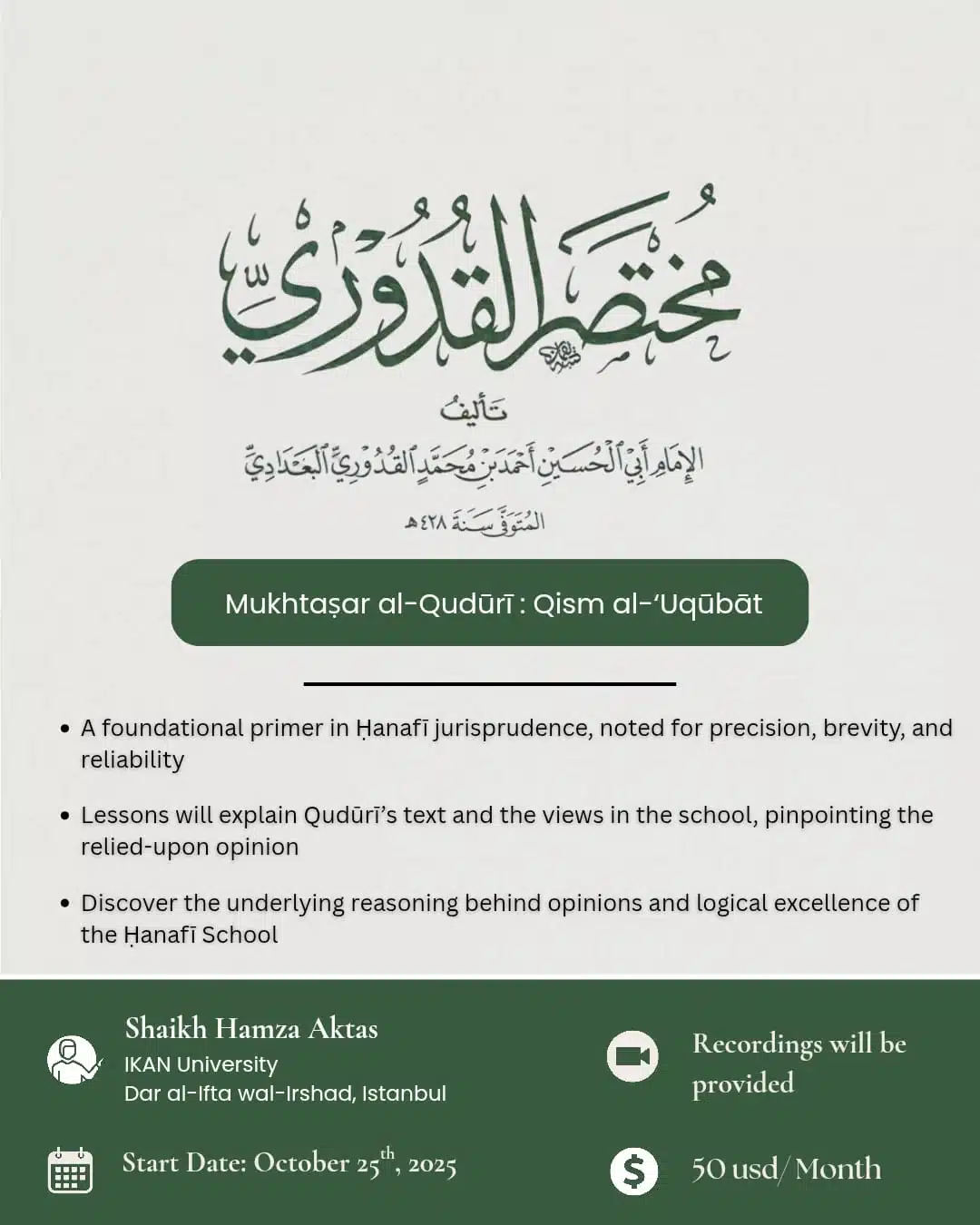Course Overview:
1. Foundational Knowledge
This course serves as an introduction to Mukhtasar al-Qudūrī, one of the most authoritative and widely taught primers in Hanafi jurisprudence. Designed for beginner students of Islamic law, the text offers a structured overview of essential legal rulings and categories. Through this course, participants will build a strong foundation in Hanafi fiqh, preparing them to engage with more advanced legal texts and concepts.
2. A Distinctive Approach to Fiqh
What distinguishes Mukhtasar al-Qudūrī—and this course—is the systematic approach to legal reasoning that it reflects. Students will explore the principles that inform Hanafi legal methodology, gaining insight into the rationale and thought process behind various rulings. Rather than merely memorizing legal outcomes, learners will be guided to understand the logic and structure that underpin Hanafi jurisprudence.
3. Introduction to Legal Maxims and Methodology
As part of building legal literacy, the course will introduce students to foundational legal maxims (qawāʿid fiqhiyyah) and methodological tools that aid jurists in extrapolating rulings for new cases. These maxims not only simplify complex legal theory but also serve as guiding principles when navigating contemporary issues. This dimension of the course will help students develop the ability to think like jurists.
4. Close Reading and Decoding the Text
A significant component of the course is the detailed reading and explanation of the text itself. Mukhtasar al-Qudūrī is known for its concise and sometimes elliptical language, so the course will focus on unpacking its meanings with clarity. Where later Hanafi scholars have differed in interpretation or legal application, these positions will be discussed, along with an analysis of the stronger or more relied-upon views within the school. This careful engagement will allow students to appreciate the depth and nuance of Hanafi legal discourse.
5. Exploring Foundational Evidences and Proofs
The course will also touch upon the basic proofs (adillah) employed by Hanafi scholars. While Mukhtasar al-Qudūrī is not a text of evidentiary discussion per se, we will highlight where classical proofs—drawn from the Qur’an, Sunnah, consensus (ijmāʿ), and analogy (qiyās)—are relevant. This will help students understand how legal rulings are anchored in the broader framework of Islamic legal theory, fostering a more holistic understanding of the school’s jurisprudential approach.
Who is it for?
This course is designed for students eager to deepen their understanding of Hanafi jurisprudence. This course is the next step after our course on Nūr al Idāh. While the original text of Mukhtasar al-Qudūrī is in Arabic, the course will be delivered in English, ensuring that it is accessible to a broader audience. This bilingual approach allows learners to engage with the content in an inclusive, approachable manner while retaining the depth of the original work.
However, a basic understanding of Arabic is highly recommended, especially for some of the introductory discussions and key terminologies used throughout the course. Familiarity with Arabic will enhance students’ comprehension of critical concepts and the finer points of the text, allowing them to engage more effectively with the scholarly material.
About the Course
This course offers a structured and in-depth study of Mukhtasar al-Qudūrī, one of the most esteemed foundational texts in Hanafi jurisprudence. Authored by the distinguished jurist Imam Abu al-Husayn Ahmad ibn Muhammad al-Qudūrī (d. 428 AH), this concise yet comprehensive legal manual has served as a cornerstone for students and scholars across centuries. Its clarity, precision, and systematic presentation have established it as an essential entry point for understanding the legal methodology and rulings of the Hanafi madhhab.
By the end of the course, students will have developed a solid grounding in the principles and rulings that form the bedrock of Hanafi fiqh. Through guided reading, discussion, and practical application, participants will be prepared to approach more advanced legal works with confidence and insight, having internalized both the content and the legal reasoning exemplified by al-Qudūrī. Engaging with Mukhtasar al-Qudūrī will not only deepen your grasp of Hanafi jurisprudence but also sharpen your capacity to analyze, synthesize, and apply Islamic legal rulings across a range of contemporary contexts. This course is more than a study of a text—it is an invitation to connect with a living tradition, rooted in scholarship, precision, and devotion.
Whether you are beginning your studies or seeking to reinforce your foundational understanding, this course offers a vital step in your path toward greater fluency in Islamic legal discourse.
This course will cover the ‘Uqūbāt section of Mukhtasar al-Qudūri which is often either fully neglected, or skimmed through at a surface level. This course aims to cover all of the following chapters in depth:
– Jināyāt
– Diyāt
– Ma’āqil
– Hudūd
– Sariqah and Quṭṭā’ al-Ṭarīq
– Ashribah
– Ṣayd and Dhabā’ih
– Uḍhiyah
– Aymān
– Da’wā
– Shahādāt
– Ādāb al Qādhi
– Qismah
– Ikrāh
– Siyar
– Hadhr and Ibāhah
– Wasāyā
– Farā’idh
Course Details:
Start date: Oct 27
Class timings:
Mon and Tue: 7:30 – 8:30 pm Madinah (12:30 pm to 1:30 pm est)
Course Curriculum
-
Telegram group for access to live classes
-
Mukhtasar al-Qudūrī: al-‘Uqūbāt | Lesson 1 | The Five Types of Homicide
56:02 -
Mukhtasar al-Qudūrī: al-‘Uqūbāt | Lesson 2 | The Five Types of Homicide Part 2
57:34 -
Mukhtasar al-Qudūrī: al-‘Uqūbāt | Lesson 3 | Qisās for the Loss of Life
59:43 -
Mukhtasar al-Qudūrī: al-‘Uqūbāt | Lesson 4 | Qisās for the Loss of Life Part 2
55:29 -
Mukhtasar al-Qudūrī: al-‘Uqūbāt | Lesson 5 | Qisās for the Loss of Bodily Organs.
53:44 -
Mukhtasar al-Qudūrī: al-‘Uqūbāt | Lesson 6 | continuation: Qisās for the Loss of Bodily Organs
50:31 -
Mukhtasar al-Qudūrī: al-‘Uqūbāt | Lesson 7 | Miscellaneous rulings related to Offences
55:31 -
Mukhtasar al-Qudūrī: al-‘Uqūbāt | Lesson 8 | Compensatory Payments for Crimes
54:59 -
Mukhtasar al-Qudūrī: al-‘Uqūbāt | Lesson 9 | Organs of the Human Body that Exist in Pairs
54:03 -
Mukhtasar al-Qudūrī: al-‘Uqūbāt | Lesson 10 | Compensatory Payment forAmputation/Dismemberment.
54:35 -
Mukhtasar al-Qudūrī: al-‘Uqūbāt | Lesson 11 | The Legally Responsible Group (‘Āqilah)
55:42 -
Mukhtasar al-Qudūrī: al-‘Uqūbāt | Lesson 12 | Offences by Riding Animals
57:37 -
Mukhtasar al-Qudūrī: al-‘Uqūbāt | Lesson 13 | Leaning Walls and Killing Slaves.
57:37 -
Mukhtasar al-Qudūrī: al-‘Uqūbāt | Lesson 14 | QASĀMAH – COMPURGATION BY OATH
57:37 -
Mukhtasar al-Qudūrī: al-‘Uqūbāt| Lesson 15 | MA‘ĀQIL – PAYERS OF DIYĀT.
57:37 -
Mukhtasar al-Qudūrī: al-‘Uqūbāt| Lesson 16 | ḤUDŪD – PUNISHMENTS FOR CONTRAVENTION OF THE LIMITS.
57:37 -
Mukhtasar al-Qudūrī: al-‘Uqūbāt | Lesson 17 | ḤUDŪD – Retraction by the Confessor and Witness.
57:37 -
Mukhtasar al-Qudūrī: al-‘Uqūbāt | Lesson 18 | ḤUDŪD continuation
57:37 -
Mukhtasar al-Qudūrī: al-‘Uqūbāt| Lesson 19: The Ḥadd Punishment for Consumption of Alcohol (Shurb)
57:37 -
Mukhtasar al-Qudūrī: al-‘Uqūbāt| Lesson 20: The Ḥadd Punishment for Consumption of Alcohol Part 2
57:37 -
Mukhtasar al-Qudūrī: al-‘Uqūbāt| Lesson 21: Ta‘zīr – Discretionary Punishment
57:37 -
Mukhtasar al-Qudūrī: al-‘Uqūbāt| Lesson 22: SARIQAH WA QUṬṬĀ‘ AṬ-ṬARĪQ – THEFT & HIGHWAY ROBBERS
57:37 -
Mukhtasar al-Qudūrī: al-‘Uqūbāt| Lesson 23: SARIQAH WA QUṬṬĀ‘ AṬ-ṬARĪQ – THEFT & HIGHWAY ROBBERS
57:37 -
Mukhtasar al-Qudūrī: al-‘Uqūbāt| Lesson 24: On Amputation
57:37 -
Mukhtasar al-Qudūrī: al-‘Uqūbāt | Lesson 25: On Highway Robbery
57:37 -
Mukhtasar al-Qudūrī: al-‘Uqūbāt | Lesson 26: ASHRIBAH – INTOXICATING DRINKS
57:37 -
Mukhtasar al-Qudūrī: al-‘Uqūbāt | Lesson 27: ṢAYD WA DHABĀ’IḤ – GAME & ANIMALS FOR SLAUGHTER
57:37 -
Mukhtasar al-Qudūrī: al-‘Uqūbāt | Lesson 28: ṢAYD WA DHABĀ’IḤ – GAME & ANIMALS FOR SLAUGHTER
54:41 -
Mukhtasar al-Qudūrī: al-‘Uqūbāt| | Lesson 29: ṢAYD WA DHABĀ’IḤ – GAME & ANIMALS FOR SLAUGHTER.
54:41 -
Mukhtasar al-Qudūrī: al-‘Uqūbāt | Lesson 30: On Dhabḥ – Slaughtering.
54:57
Student Ratings & Reviews

-
LevelIntermediate
-
Last UpdatedFebruary 3, 2026

A course by


